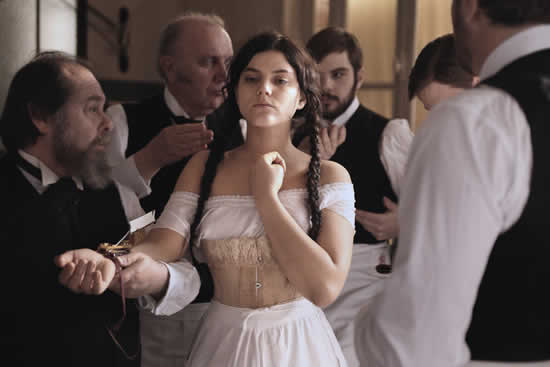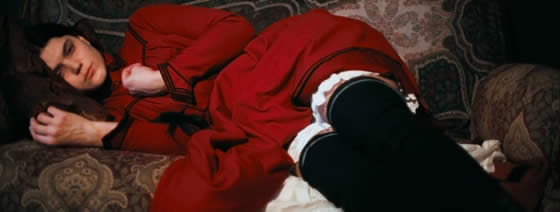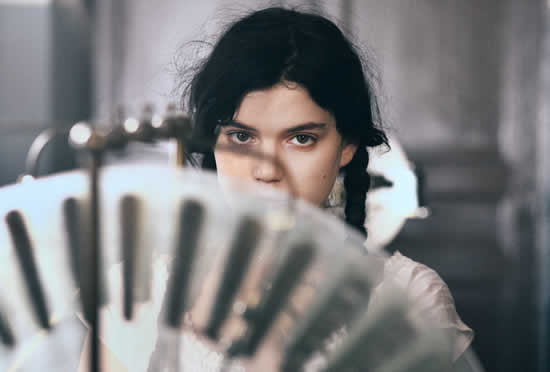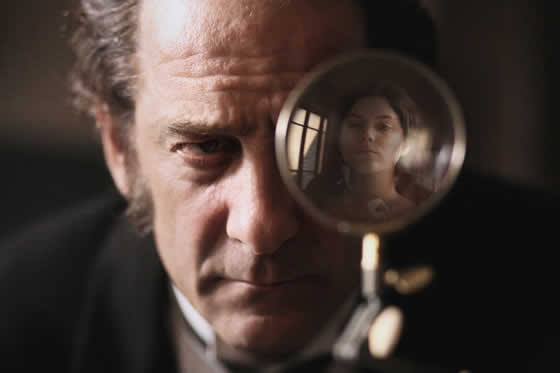 Augustine is an examination of the real case story and unusual relationship between Dr. Jean-Martin Charcot, the pioneering 19th century French neurologist – whom Sigmund Freud studied under – and Augustine, his star teenage patient.
Augustine is an examination of the real case story and unusual relationship between Dr. Jean-Martin Charcot, the pioneering 19th century French neurologist – whom Sigmund Freud studied under – and Augustine, his star teenage patient.
After suffering an inexplicable seizure which leaves her paralyzed on her right side, 19-year-old illiterate kitchen maid Augustine (27 year-old singer-turned-actress Soko in a break out performance), is shipped off to Paris’ all female psychiatric hospital Pitié-Salpêtriere which specializes in detecting the then-fashionable ailment of ‘hysteria’. Augustine captures the attention of Dr. Charcot (Vincent Lindon, Mademoiselle Chambon, Welcome) after a seizure, which appears to give her intense physical pleasure. Intrigued, he begins using her as his principal subject hypnotizing her in front of fellow doctors – as she displays her spectacular fits in lecture halls – and eventually blurring the lines between doctor and patient.
The following is an interview with the star of Augustine, Stéphanie Sokolinski, known as Soko. She was born in 1985 in Bordeaux, France, and made her name on MySpace and the radio, with DJs giving prominent airplay to her track I’ll Kill Her. After taking a break from music, she joined Pete Doherty to perform The Libertines‘ Albion and Can’t Stand Me Now at the 2011 We Love Green Festival. In February 2012, her album I Thought I Was An Alien was released along with the single First Love Never Die, with a video she co-directed with Spike Jonze. In 2007, Soko branched into acting with roles in two films, Dans les cordes by Magaly Richard-Serrano and Ma vie n’est pas une comédie romantique by Mac Gibaja, followed by Xavier Giannoli’s In The Beginning, which earned her a César nomination for Best Female Newcomer in 2010. Since then, Soko has played young Béatrice Dalle in Bye Bye Blondie by Virginie Despentes and appeared in a Spike Jonze short entitled Mourir auprès de toi.
Bijan Tehrani: How did you end up playing this part? I know you have done some acting before but this is such a different type of part to play.
Soko: It was very hard to get the part because they had me wait 8 months before they even auditioned me. They didn’t want to audition me because they said they wanted somebody unknown; I was like “but I am totally unknown!” and they were like “No, you’re way too famous, we don’t want you!” and in the end, they finally accepted to audition me. It was really hard and challenging but in the best ways possible, and that’s what I need to be motivated to do a film. I needed to be so different from who I am. I played someone who had difficulty communicating and barely talks ever when I’m someone very chatty and talkative. It was amazing to play, and she is also very inward, she has this whole inside world going on that you can’t really tell, when I’m so easy to read… So it was pretty challenging to do.
BT: I think one of the reasons you succeeded in that is that it was the other extreme. Something in the middle might not have worked. She’s someone who has a lot to say but cannot communicate. I think it’s a very challenging part and you made it believable. How did you manage to make this part believable to the audience?
S: Everything felt very real. As soon as I was in her shoes and I had my eye shot and I was acting paralyzed and had my arm paralyzed, all these things helped make her real because I was in my body feeling just like her. I was wearing a corset and walking in those little heels, and having long hair, with no make-up at all, and not even recognizing myself in the mirror. She wanted me to look very tired and I have very dark circles, so it was very easy to embody who she was. Also because we were shooting on amazing locations, like where it really happened, we really were in La Sapeltriere, where she got cured and spent so much time there… So it was easier to connect with what happened at that time.
 BT: I think when an actor or actress convinces you is when the body is exactly following the part, but its most convincing part is the eyes, and I think your eyes are so convincing: you can see that kind of sorrow and sometimes passion, or sometimes despair. How much did working with Alice help you to understand the part?
BT: I think when an actor or actress convinces you is when the body is exactly following the part, but its most convincing part is the eyes, and I think your eyes are so convincing: you can see that kind of sorrow and sometimes passion, or sometimes despair. How much did working with Alice help you to understand the part?
S: We worked a lot together before, for about 6 or 7 months before. She didn’t want me to read anything about Augustine or about hysteria or this era, and she wanted me to be a total virgin about everything that was happening to her, because she is totally clueless about what this is, so she wanted me to be totally clueless too, and be like the spectator of what is happening to my body. We did watch a lot of patients, we got very influenced by Francesca Woodman’s photography, with that kind of goth despair and longing, loneliness, and her will of being seen very naked… She would show me photographs, drawings or paintings of real positions that are the weirdest thing and you couldn’t imagine doing with your body because they look impossible to do but the hysteria makes you do that, it totally transforms your body.
BT: Working with the other actors is also important because it is like an orchestra. A harmony is needed to make a film. How was it to work with Vincent Lindon?
S: He was for me the best partner I could hope for because he was so caring and very attentive to me, and very respectful and helpful. I think he really loved being a mentor and helping giving directions, but Alice is also doing such a great job directing you so well. So he was giving me tools, a bit like an acting coach, every now and then sort of lecturing anyone there who would want to listen, he would take examples how to watch this or that. He would say for example – you don’t need to say this because people have seen you x minutes ago doing this so they already know what you are thinking, you don’t need to tell them what you’re thinking… He was very good at making it more simple, and making sure that we don’t repeat ourselves. He was also very caring. When I had to do the naked scenes, he would take off his coat to warm me up and protect me if I was cold. It was a very very good relationship.
BT: Something extraordinary that you did in this film is that Augustine in this film changes places in a way. It’s the professor who is leading her to being cured but in a place, we see that she is the one leading the professor and helping him to find the relief from his life.
S: There’s a saying that says a hysteric is a woman who is a slave who’s looking for a master that she can master.
BT: That transformation in your character also comes across as very believable. Often times, a character transforms in a film. In a book it’s easier, in a film it’s harder to be believable because that transformation should be accepted by the audience. And in your case, it was very believable.
S: She is the victim from the beginning. He wanted her to step out of her victim world and own it, tell him to shut up for a second, take control and empower herself.
BT: How much did your background in music – I know that you also have an acting background – help you in this part? Does it play anything in the acting?
S: I don’t think it does. For me, it’s two very different things in my life, and I don’t see them connecting that much, except that Alice asked me to do the music for the beginning and end credits. I usually don’t want to mix things up but I ended up doing one of the songs for the movie.
BT: I think if someone asked me who is Soko, I would say she is someone who is exploding with emotion, and i think that is something you hear in your songs and also in your acting.
S: Thank you!
BT: Any other acting projects that you are working on or perhaps directing projects?
S: I have my idea of a script that I want to start working on very soon to direct but right now, I’m making my second record and I don’t have time to do anything else, so I have offers for amazing movies that I’m really excited about but I don’t know yet if I’m really going to be able to make it. I don’t want to do too many movies so I am trying to do only things that are vital, and parts that take me as far away from who I am as possible. But I am so fulfilled with music, it’s what keeps me happy every day, so it’s very hard to imagine not doing music for too long to just do movies.
